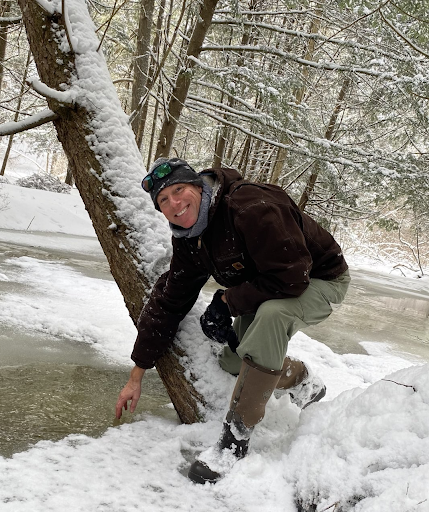S. Mažeika Patricio Sullivan (December 30, 1972 – May 31, 2024)

S. Mažeika P. Sulliván, Director of the Baruch Institute of Coastal Ecology and Forest Science (BICEFS) and Professor in the Department of Forestry and Environmental Conservation at Clemson University, passed away on May 31st, 2024, in McClellanville, South Carolina, at the age of 51.
Mažeika was a brilliant scientist, a valued colleague, a champion for headwaters, wetlands, and estuaries, and a leader in promoting diversity, equity, and inclusion in the aquatic sciences.
Mažeika received a B.A. in Anthropology and Native American Studies from Dartmouth College, and an M.Sc. in Biology and Ph.D. in Natural Resources from the University of Vermont. He then served as a Postdoctoral Research Fellow at the University of Idaho, where he assisted the Bureau of Indian Affairs and the Coeur d’Alene Tribe of northern Idaho on Native American water rights issues. He remained committed to the tribe and championing inclusion of Native Americans in research for the rest of his career. From 2008-2022, Mažeika was a professor in the School of Environment and Natural Resources (SENR) at The Ohio State University, and later Director of the Ramsar-designated Schiermeier Olentangy Wetland Research Park from 2014-2022. In 2022, he became Director of BICEFS at Clemson University in Georgetown, SC, where he also led the Streams, Rivers, and Estuaries (STRIVE) Lab.
Mažeika was a gifted scientist whose work focused on community and trophic ecology; water quality and quantity; land-water linkages in watershed, wetland, and coastal ecosystems; as well as integrated ecology, fluvial geomorphology, and biogeochemistry. He embraced approaches and activities that applied science to conservation, restoration, and policy.
His dedication to wetlands, headwaters, estuaries, and connectivity between aquatic and terrestrial systems was evident in both his science and his service. Mažeika used his expertise to influence policy in one of the seminal environmental issues of our time: shaping the Clean Water Act’s definition of Waters of the U.S. (WOTUS). The extent of the Clean Water Act’s jurisdiction over streams and wetlands has become increasingly unclear, putting many waters that are critical to the physical, chemical, and biological condition of our Nation’s waters at risk of pollution and degradation. Various federal administrations and courts have attempted to clarify jurisdiction over these waters.
Mažeika’s focus and vision were critical to AFS’s and the Consortium of Aquatic Science Societies’ work in shaping a science-based definition of WOTUS. His invaluable expertise and leadership set the foundation for research and policy over many years. Mažeika was a member of the U.S. Environmental Protection Agency’s Science Advisory Board Connectivity of Streams and Wetlands to Downstream Waters Panel (2013-2014). He co-authored articles regarding scientific concerns with the proposed Navigable Waters Protection Rule (Colvin et al. 2019; Sullivan et al. 2019; 2020; Sullivan 2021). In 2022, he contributed to an Amicus brief to the U.S. Supreme Court regarding restrictions on WOTUS. He was a skilled science communicator who spoke eloquently and clearly to Capitol Hill decision-makers through briefings and hearings on this topic. In 2023, Mažeika testified before the U.S. Senate regarding the impact of the U.S. Supreme Court decision in Sackett v. EPA, which left most U.S. wetlands and streams unprotected by federal Clean Water Act safeguards. During the briefing, Senator Carper referred to Mažeika’s upbringing on a Vermont farm, highlighting a moment when Mažeika, polished and well-spoken, represented both current science as well as his deep agricultural roots.
Mažeika was a tireless and visionary leader in making aquatic science more welcoming and inclusive for all. He celebrated diversity, including his own Lithuanian, Irish, and Spanish heritage, while being fluent in Spanish and Lithuanian and proficient in French. He was Chief Diversity Officer at SENR, where he created a framework for advancing diversity and inclusion focused on Tribal Nation reciprocity, minority partnerships, and curriculum diversity. He led the Society for Freshwater Science’s (SFS) Justice, Equity, Diversity, and Inclusion (JEDI) Task Force (2020-2023) and instituted many programs and changes in three short years. In addition to organizing events exploring race and ethnicity, making recommendations for increased Spanish language programming, developing the website, and expanding international membership, he formed the Council of Underrepresented Voices (CUV). A CUV member is now officially included on the SFS Board of Directors, enriching decision-making with broader perspectives. His work aimed to center the perspectives of others. A collaborator on the JEDI Task Force wrote, “Mažeika was the main reason I became active within SFS. His love for people, science, and drive to create a space where all voices were heard in science led me to want to make my voice heard as well. He inspired me to let my light shine just as his was shining, lighting up paths for all behind him.”
On top of his professional accomplishments, Mažeika balanced being a doting father and loving husband. He enjoyed sports and outdoor activities with his children, passing along his love for nature to each of them and fostering a close-knit family bond. He is survived by his four spirited and fearless children, Adela, Joaquin, Santiago, and Gael, and his wife, Gabriela. Mažeika was a wonderful, supportive colleague and is truly missed.
— Susan A. R. Colvin, Robert M. Hughes, D. Banta Winters, Amy Rosemond, Zanethia Barnett, Nayeli K. Sanchez, Stephanie S. Li, Robert B. Keast

